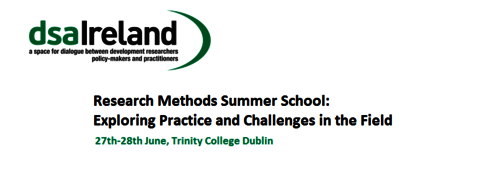Date: Tuesday 27th and Wednesday 28th June 2017 Time: 09:00 – 17:00 (w/ Sandwich Lunch)
Venue: TRISS Seminar Room, Room C6.002 (6th Floor), Arts Building, Trinity College Dublin
Rationale:
The aim of this Summer School is to explore research methods for development. Following on from the Research Methods Workshop held in September 2016, this Summer School aims to develop further the questions around research methods for development arising from the September workshop. It will focus on methods in quantitative projects, qualitative projects, and monitoring and evaluation. Specifically, it will aim to explore the building blocks of research: how it is that we collect and make sense of statistical and text data for research. The workshop will also aim to address questions that remain pertinent in working with Irish Aid funded results frameworks. Anyone with an interest in this range of topics is welcome to attend. The objective is to provide an overall sense of practical research methods which are applicable to all research and to results based management, as well as a platform for input and discussion among practitioners.
This workshop will run for two days, and will cost €100 to participate. Each day will comprise 5 sessions, and a sandwich lunch is included. Space on this workshop is limited. Please RSVP to Mairéad Finn, DSA Ireland Coordinator, at info@dsaireland.org by June 22nd 2017.
Register via Eventbrite: https://www.eventbrite.ie/e/
Programme
Download the programme here [PDF or Word]
Programme – Tuesday 27th June 2017 | |
09:00-09:30 | Registration (Tea & Coffee)
|
09:30-10:00 | Introduction |
10:00-11:00 | Session One: Developing and Implementing a Theory of Change. Ana Stiglic, Regional Monitoring & Evaluation Manager for the Norwegian Refugee Council |
11:00-11:30 | Coffee Break (Tea and Coffee) |
11:30-12:30 | Session Two: Strengthening Ethical Practice in Development and Humanitarian Research. Maja Haals Londorf, Children’s Research Network |
12:30-13:30 | Sandwich Lunch (Tea & Coffee) |
13:30-14:30 | Session Three: Researching with Marginalised Communities: Focus on Children. Sinéad Matson, PhD Candidate, Maynooth University. |
14:30-15:30 | Session Four: Getting Quality Data from Interviews. Dr. Paula Mayock, Director, Masters in Applied Social Research, Trinity College Dublin. |
15:30-16:00 | Coffee Break (Tea & Coffee) |
16:00-17:00 | Session Five: Doing Better Focus Groups: A How to Guide. Dr. Paula Mayock, Director, Masters in Applied Social Research, Trinity College Dublin. |
Programme – Wednesday 28th June 2017 | |
08:30-09:00 | Registration (Tea & Coffee) |
09:00-10:00 | Session One: Choosing the Right Evaluation Design. Ana Stiglic, Regional Monitoring & Evaluation Manager for the Norwegian Refugee Council |
10:00-11:00 | Session Two: Data Gathering in Fragile Contexts. Dr. Alex Tran, Monitoring, Evaluation, Accountability, and Learning Advisor at GOAL Global |
11:00-11:30 | Coffee Break (Tea and Coffee) |
11:30-12:30 | Session Three: Choosing the Right Statistical Test Margaryta Klymak, PhD, Department of Economics, Trinity College Dublin. |
12:30-13:30 | Sandwich Lunch (Tea & Coffee) |
13:30-14:30 | Session Four: Doing Research in Post-War Settings Dr. Walt Kilroy, Institute for International Conflict Resolution and Reconstruction, DCU. |
14:30-15:30 | Session Five: Digital Data Gathering and Data Visualisation for Research Dr. Alex Tran, Monitoring, Evaluation, Accountability, and Learning Advisor at GOAL Global |
15:30-16:00 | Coffee Break (Tea & Coffee) |
16:00-17:00 | Session Five: Pulling it all together: The Value and Challenges of Results Frameworks in Development Programming. Panel Discussion: · Paula Nolan, Irish Aid · Anne-Marie Coonan, Concern Worldwide · Enida Friel, Oxfam Ireland · Peter McEvoy, Independent Consultant |
Speaker Profile
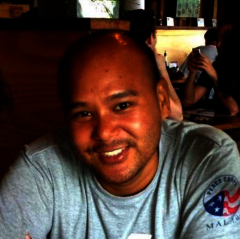 Alex is a Monitoring, Evaluation, Accountability, Learning, and Research Advisor with the humanitarian aid organization GOAL Global. Alex graduated with a Bachelor of Science degree in International Health from Georgetown University in Washington DC in 2008. Afterwards he joined the United States Peace Corps volunteer and served as a Peace Corps Volunteer in South Africa from 2009 – 2011 and Malawi from 2011 – 2012. He graduated from Emory University in Atlanta, GA with his Master of Public Health degree in Global Epidemiology in 2014.
Alex is a Monitoring, Evaluation, Accountability, Learning, and Research Advisor with the humanitarian aid organization GOAL Global. Alex graduated with a Bachelor of Science degree in International Health from Georgetown University in Washington DC in 2008. Afterwards he joined the United States Peace Corps volunteer and served as a Peace Corps Volunteer in South Africa from 2009 – 2011 and Malawi from 2011 – 2012. He graduated from Emory University in Atlanta, GA with his Master of Public Health degree in Global Epidemiology in 2014.
Alex joined GOAL in 2015 as a member of GOAL's Ebola response in Sierra Leone. He has led initiatives to strengthen the use of Ebola response data to better direct Ebola response and recovery resources and has worked on several other emergency response operations with GOAL to increase use of data for decision making in Ethiopia, Sudan, South Sudan, Iraq, and Syria. Alex has strong interests in digital data gathering, data analysis, and GIS mapping to improve emergency response and international development programs
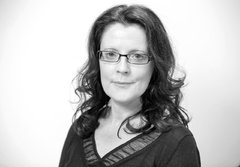 Dr Paula Mayock is an Assistant Professor at the School of Social Work and Social Policy, Trinity College Dublin. Her research focused primarily on marginalised youth and adult populations, covering areas such as homelessness, drug use, drug treatment and mental health. She is the founder and Co-director of the Women's Homelessness in Europe Network (WHEN), which seeks to develop, promote and disseminate multi-disciplinary academic and policy relevant research that enhances understanding of women's homelessness.
Dr Paula Mayock is an Assistant Professor at the School of Social Work and Social Policy, Trinity College Dublin. Her research focused primarily on marginalised youth and adult populations, covering areas such as homelessness, drug use, drug treatment and mental health. She is the founder and Co-director of the Women's Homelessness in Europe Network (WHEN), which seeks to develop, promote and disseminate multi-disciplinary academic and policy relevant research that enhances understanding of women's homelessness.
She has recently co-edited a book entitled Women's Homelessness in Europe (published by Palgrave Macmillan) with Joanne Bretherton, Centre for Housing Policy, University of York. She is the author of numerous articles, book chapters and commissioned research reports and is an Assistant Editor to the international journal Addiction.
Ana holds a Master’s degree in Research Methods from University of Witwatersrand in South Africa and a B.Sc in Psychology from Clemson University in South Carolina, U.S.A. Much of her career has been spent in application of research methods and analytical models within Monitoring and Evaluation Units of NGOs. Ana currently works as the Middle East Regional M&E Advisor for the Norwegian Refugee Council covering Syria, Iraq, Lebanon, Jordan, Turkey and Palestine with a focus on embedding and optimizing measurement and generating increased understanding of NRC’s impact during emergency responses and protract crises. Ana has previous worked for GOAL in Uganda and in the Regional M&E Coordinator capacity covering Africa. Ana currently lives in Jordan.
Margaryta Klymak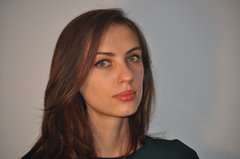
Margaryta is a PhD Economics candidate and Trinity College Dublin Grattan scholar. Her research focuses on the role of the private sector and international trade in the developing economies, an important topic both from an academic and a policy perspective. Margaryta has been a teaching assistant for the Econometrics module since 2015.
She received a Dermot McAleese Award (teaching award) in 2017. Margaryta earned an MSc Economics from the University of Edinburgh and double first class honours in BSc Business Economics and a BSc Management from Kyiv Polytechnic Institute, Ukraine. Prior to start of her PhD Margaryta worked as a data analyst in England.

IRISH AID, DEPT OF FOREIGN AFFAIRS, Development Specialist, Performance and Planning Unit.
Paula Nolan began her career in development cooperation with the International Red Cross in Cambodia where she managed a number of relief operations between 1992 and 1995. On her return from Cambodia Paula returned to college as a mature student and undertook an M.A. in Development Studies. For the following four years she worked on short term contracts for various development co-operation agencies in Kenya, Uganda and Pakistan and was also a Dublin based desk officer for two of those agencies.
In 2003, Paula joined the Department of Foreign Affairs and Trade as Head of Development in Ireland’s embassy in Lesotho for a period of four years. From Lesotho, Paula took up a similar position in Ireland’s embassy in Mozambique. On return to Irish Aid HQ in July 2009, Paula spent five years as Irish Aid’s policy lead on global education. Since 2014 Paula has produced Irish Aid’s Annual Report and is institutional lead on Aid Transparency and Results.
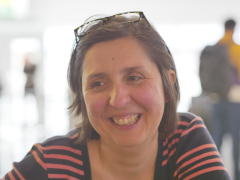 A native of Albania, Enida trained as a medical doctor there and followed on with two diplomas from the School of Tropical Medicine in Liverpool, UK. She worked with international NGOs such as International Rescue Committee and American Refugee Committee for about 7 years mostly in Sub-Saharan African before moving to Ireland and joining Oxfam in 2005. When in Ireland she also completed a Master's in Public Health with University College Cork. She has worked on different managerial and advisory position in development and humanitarian contexts.
A native of Albania, Enida trained as a medical doctor there and followed on with two diplomas from the School of Tropical Medicine in Liverpool, UK. She worked with international NGOs such as International Rescue Committee and American Refugee Committee for about 7 years mostly in Sub-Saharan African before moving to Ireland and joining Oxfam in 2005. When in Ireland she also completed a Master's in Public Health with University College Cork. She has worked on different managerial and advisory position in development and humanitarian contexts.
Enida's earlier areas of interest were reproductive health, HIV and tropical diseases. Her current areas of interest are results based management, disability inclusiveness, gender equality. In addition to working with Oxfam, she is an Adjunct Assistant Professor with the School of Medicine in Trinity College where she teaches and supervises students of Masters in Global Health and Masters in Development Practice.
Peter McEvoy 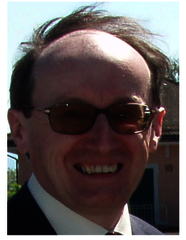 Peter has worked extensively (across 28 countries) as an independent development and capacity-building consultant in a wide variety of international development settings, mainly in the education, social and civil society sectors. He has undertaken feasibility, appraisal, strategic planning, and evaluation assignments on behalf of Irish Aid, missionary bodies, NGOs, and the European Commission. He has also served with Irish Aid as in-country program coordinator in Lesotho, and prior to that as the programme director of HEDCO-Ireland (Higher Education for Development Cooperation).
Peter has worked extensively (across 28 countries) as an independent development and capacity-building consultant in a wide variety of international development settings, mainly in the education, social and civil society sectors. He has undertaken feasibility, appraisal, strategic planning, and evaluation assignments on behalf of Irish Aid, missionary bodies, NGOs, and the European Commission. He has also served with Irish Aid as in-country program coordinator in Lesotho, and prior to that as the programme director of HEDCO-Ireland (Higher Education for Development Cooperation).
Peter holds an MSc Econ from Trinity College Dublin, and is currently engaged in doctoral research in Dublin City University Business School. His publications include:
(2016) with Brady M., Munck R., Nakabugo, G. “Effectiveness and Complexity in Development-Focused Higher Education Partnerships” in Banks C. (ed) Global Perspectives on Strategic International Partnerships. International Institute for Educational Planning & German Academic Exchange Service. New York and Berlin.
(2016) with Brady M., Munck R. “Capacity development through international projects: a complex adaptive systems perspective”, in International Journal for Managing Projects in Business (IJMPB). Vol 9; No 3; pp 528-545
(2013) “Past and Current Experiences of Higher Education Partnership in Context of Development Co-operation with Africa”, in Policy & Practice, 16. Centre for Global Education, Belfast.
(2012) “Negotiated Development—Rediscovering a Global Development Ethic” in S. Christensen et al., Engineering, Development and Philosophy. Springer, Dordrecht, Germany.
(2010) with Barrett E., Nakabugo G., Munck R. ”Higher Education, Internationalisation and Global Development: An Irish Case Study” in Internationalisation of European Higher Education Manual—6th supplement. European University Association / Raabe, Berlin.
 Dr. Walt Kilroy is the Associate Director of DCU's Institute for International Conflict Resolution and Reconstruction. His research interests include development, conflict, and post-war reconstruction, and the interactions between these processes. His teaching has included these topics, as well as international media and reporting. His doctoral thesis was awarded the Basil Chubb Prize for the best PhD in political science (2012) by the Political Studies Association of Ireland. It looked at the way in which ex-combatants were dealt with after the wars in Sierra Leone and Liberia in West Africa, through the programmes for Disarmament, Demobilisation and Reintegration (DDR). A monograph based on his thesis is published by Palgrave Macmillan (April 2015). Walt previously worked in the Horn of Africa for the development organisation, Trócaire, on conflict and advocacy (2004-06).
Dr. Walt Kilroy is the Associate Director of DCU's Institute for International Conflict Resolution and Reconstruction. His research interests include development, conflict, and post-war reconstruction, and the interactions between these processes. His teaching has included these topics, as well as international media and reporting. His doctoral thesis was awarded the Basil Chubb Prize for the best PhD in political science (2012) by the Political Studies Association of Ireland. It looked at the way in which ex-combatants were dealt with after the wars in Sierra Leone and Liberia in West Africa, through the programmes for Disarmament, Demobilisation and Reintegration (DDR). A monograph based on his thesis is published by Palgrave Macmillan (April 2015). Walt previously worked in the Horn of Africa for the development organisation, Trócaire, on conflict and advocacy (2004-06).
Prior to that, Walt worked in journalism for print, radio, and television, and was Deputy Foreign Editor at the Irish public service broadcaster, RTE. He has reported from conflict zones such as Afghanistan and the Balkans. He received the National Science and Technology Journalism Award (Television Category) for his reporting on climate change for RTE News.
Sinead Matson, M.Ed, H.Dip. Montessori, B.A.

Sinead Matson is a current full-time doctoral student in Maynooth University Education Department. She is a John & Pat Hume Scholar and her research is currently focusing on the perceived value and cultural nuances of play in early childhood education in urban India. Sinead has worked for fifteen years in the areas of early childhood education and education in the roles of Montessori early childhood educator, private primary school principal, Montessori teacher trainer, lecturer and course coordinator for Early Childhood Education degrees.
Sinead has developed modules at levels 6-8 in early childhood education. Since 2010, Sinead has travelled back and forth to India to volunteer in a primary school working with marginalised communities and it’s NGO; she subsequently founded an educational charity to work in partnership with them. Sinead has recently stepped down as vice-chair of the Early Childhood Research Group facilitated by Children’s Research Network Ireland and Northern Ireland (CRNINI) but still remains an active member.
![]() Maja Haals Brosnan
Maja Haals Brosnan
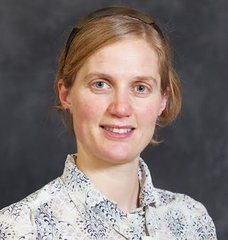 Maja Haals Brosnan is the Research Co-ordinator for the Children's Research Network. Her role is to support researchers in Ireland and Northern Ireland by responding to research queries, organising events and training according to members' needs. She oversees the publication of the Children's Research Digest and the Network's annual conference in December. She also directs a variety of special interest groups under the Network, including one on child and youth participation with a strong focus on ethics. Maja has a particular interest in research methodology and ethics, supporting researchers in optimising the influence of their research on policy and practice as well as to support practitioner researchers.
Maja Haals Brosnan is the Research Co-ordinator for the Children's Research Network. Her role is to support researchers in Ireland and Northern Ireland by responding to research queries, organising events and training according to members' needs. She oversees the publication of the Children's Research Digest and the Network's annual conference in December. She also directs a variety of special interest groups under the Network, including one on child and youth participation with a strong focus on ethics. Maja has a particular interest in research methodology and ethics, supporting researchers in optimising the influence of their research on policy and practice as well as to support practitioner researchers.
Maja has a background in the not-for-profit and international development sectors. Most recently she worked as a researcher for Early Childhood Ireland. She has volunteered as a researcher for the Irish Refugee Council and is a former CES graduate intern. She is currently lecturing in early childhood part time and completing her PhD thesis in social anthropology on adverse childhoods in post-genocide Rwanda. She has published on methods for researching with children and young people.
